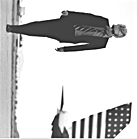
 by Jesse Woghin
by Jesse Woghin
Can You Still Feel?
Jason Falkner
There is still pertinent rock music being made in the late 1990s, despite popular opinion to the contrary. Jason Falkner is proof that there is hope for a genre that many believe has all but breathed its dying breath. While the sometimes leather-clad music of Falkner's is reticent of some of power-pop's greatest (most obviously the Beatles, Elvis Costello and Big Star), his music often breaks away from these influences and sprawls in unforeseen directions. Yet it is the pure-pop aesthetic that unifies Falkner's sound.
On Falkner's latest release, Can You Still Feel?, he is able to effortlessly move from the hand-clapping, crashing guitar, pop sing-a-long of "Author Unknown" (the album's opener), to the lush and dreamy ballad feel of "Revelation." It is on this song that Falkner's greatest gift becomes apparent: his ability to combine serious songwriting with a bubble-gum pop sensibility. Falkner is able to pull off singing, "So why am I down when there is life all around?" and still maintain the song's integrity and appeal through his vocal delivery and intricate, almost ethereal guitar work. Other highlights include the almost Cars-like sound of "My Lucky Day," driven by an unbelievably catchy Moog hook and the George Harrisonesque guitar majesty of "Eloquence".
After stints in the Three O'Clock, Jellyfish, and the Grays, Falkner has taken total control of his music on Can You Still Feel?, his second solo album. Falkner not only composed all of the music, but also plays all of the instruments on the album (save strings and woodwinds). He even co-produces the album with Nigel Godrich, who has become the producer-of-the-moment after his work on Radiohead's "OK Computer". It seems that it's this collaboration with Godrich that takes Falkner's music beyond the framework of contemporary pop. The album's production is seamless and truly allows Falkner's songwriting to take on a form not often heard today. The production is able to expound upon the beauty of Falkner's simple, at times sugary-sweet hooks, through its layers of elaborate instrumentation and yet keep the simple pop feel of his music without causing that instrumentation to seem trite or out of place.
The multi-faceted Falkner has honed his craft to near perfection on this release, and yet this fact is never overbearing in the music. He does not pretentiously assault his audience with these songs, but rather lures them in with the honest and carefree melodies of his intelligent pop-rock. This ability is an increasing rarity at a time when Marilyn Manson is arguably rockstar supreme du jour. In the end, Falkner's meticulous and complex album comes off as naturally and simplistically as the sound it embodies.
Copyright © 1999, The Oberlin Review.
Volume 127, Number 18, April 2, 1999
Contact us with your comments and suggestions.